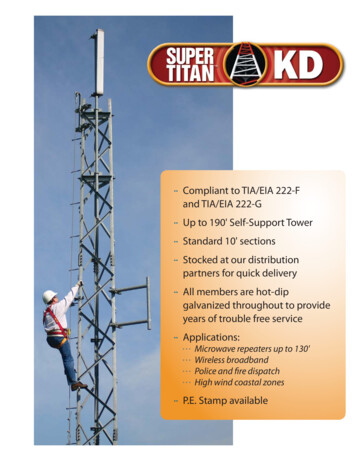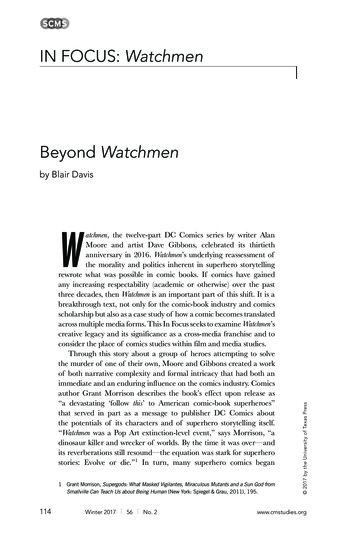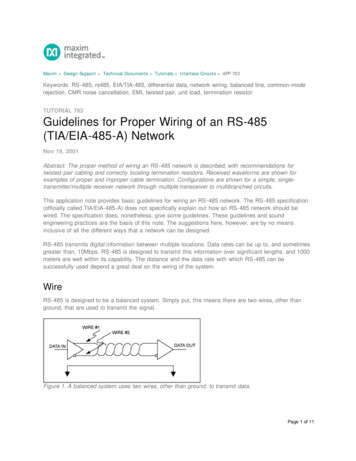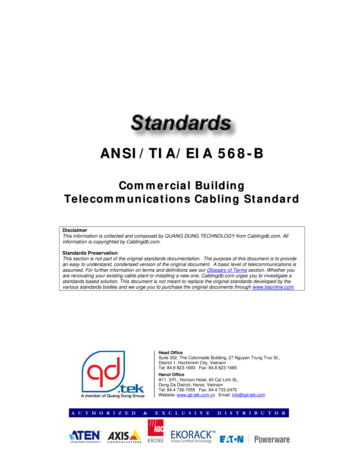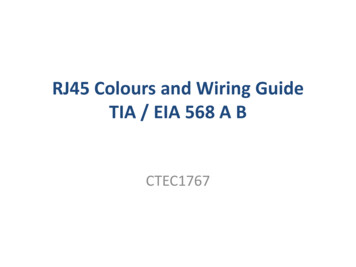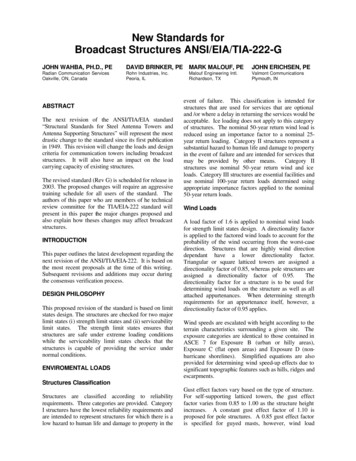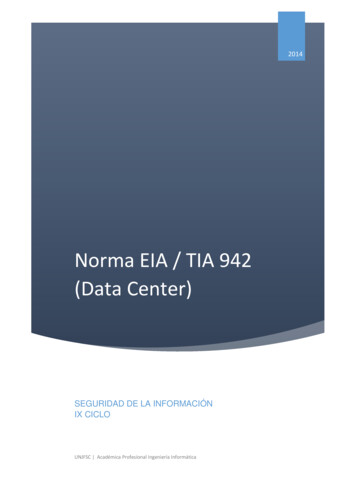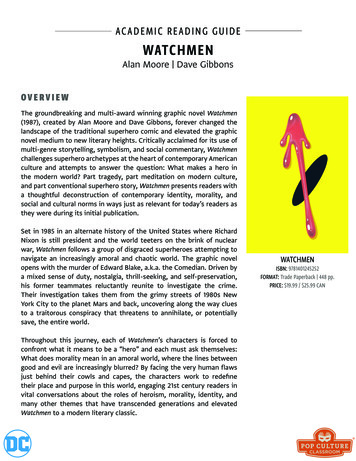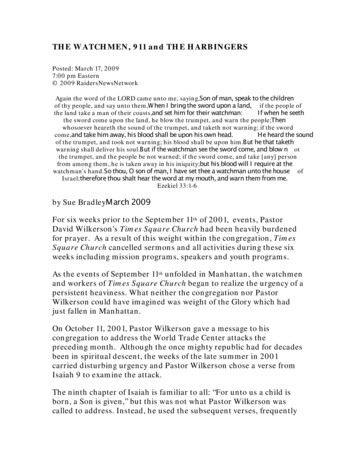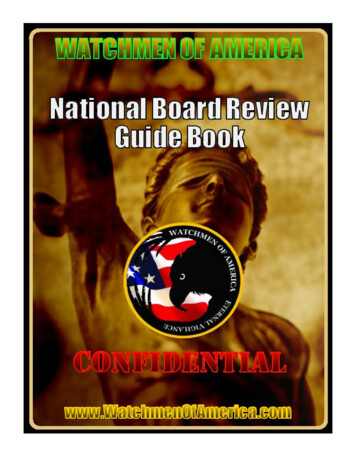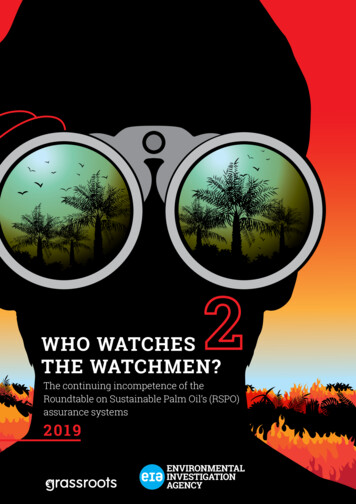
Transcription
WHO WATCHESTHE WATCHMEN?The continuing incompetence of theRoundtable on Sustainable Palm Oil’s (RSPO)assurance systems2 0191
ACKNOWLEDGEMENTSThis report was written and edited by theEnvironmental Investigation Agency (EIA) andGrassroots. This document has been producedwith the financial assistance of the NorwegianAgency for Development Cooperation (NORAD)and the Department for International Development(DFID). The contents are the sole responsibilityof EIA and Grassroots.Designed by:Alexander HuwylerCONTENTSSUMMARYSUMMARY1WHO WATCHESTHE WATCHMEN?In 2015, the Environmental Investigation Agency (EIA) andGrassroots released the report Who Watches the Watchmen?on the implementation of the certification systems of theRoundtable on Sustainable Palm Oil (RSPO).2It revealed extensive fraud as well as sub-standard andunderhand assurance processes within the RSPO. The RSPOis often hailed as the best certification scheme for palm oilbased on its standard – the Principles and Criteria (P&C).However, it receives far less scrutiny as to how it is ensuringits standards are adhered to and, therefore, its impact.HOW DOES RSPOCERTIFICATION WORK? 3Printed on FSC paperNovember 2019Environmental Investigation Agency (EIA) UK62-63 Upper Street, London N1 ONY, UKT: 44 (0) 20 7354 7960E: orgEIA USP.O. Box 53343Washington DC 20009 USAT: 1 202 483 6621E: info@eia-global.orgwww.eia-global.orgCover image:Alexander HuwylerWHAT IS THEASSURANCETASK FORCE?6KEY FINDINGS FROMTHE ASSURANCETASK FORCE10Four years on from that report, the RSPO is about to startimplementing its new and improved P&C – and we returnto the scene of the crime to assess what, if anything, haschanged and how the RSPO has responded to the seriousconcerns raised in 2015.Investigations have found that the action taken by theRSPO is severely lacking. Despite it setting up an AssuranceTask Force, this body has failed to deliver and completeits objectives. The Assurance Task Force stands as oneof the worst-run working groups of the RSPO. It has beendisorganised, unprofessionally managed, and has chronicallymissed deadlines.A COMPROMISEDCOMPLAINTS SYSTEM12CASE STUDIES14The last update from the Assurance Task Force in 2018reported 55 per cent of the activities were incomplete.Of the five key objectives under the Task Force, only thedevelopment of Free, Prior and Informed Consent guidelineshas been completed, but their effectiveness is unknown. Forthe other four objectives, the actions and outputs under eachof them has not led to the fulfilment of the objectives.23Many of the same issues remain, have recurred and couldeasily occur again. Non-adherence to the RSPO’s standardsis systemic and widespread, and has led to ongoing landconflicts, labour abuses and destruction of forests.CONCLUSION ANDRECOMMENDATIONSAs the world approaches 2020 targets to halt deforestation,the RSPO needs to rapidly implement radical solutions torestore its credibility. We question whether the RSPO iswilling and able to rectify its systemic failures – ultimately,voluntary certification is too limited by its voluntary nature.Aerial view of oil palmplantation meeting forest.213
WHO WATCHES THE WATCHMEN?In late 2015, EIA and Grassroots published the report1Who Watches the Watchmen?. It demonstrated a seriousbreakdown of the Roundtable on Sustainable Palm Oil’s(RSPO) assurance and certification system with some of theissues and specific problems being funnelled through theRSPO’s complaints system – a system that was nearly aswoeful in performance.The reputationally damaging evidence exposed thedysfunction, naivety of implementation, recklessmanagement and multiple structural weaknesses whichwere facilitating a wholesale greenwashing of the palm oilsector.The Watchmen report identified: auditors providing fraudulent assessments that cover upviolations of the RSPO Standard and procedures; auditors failing to identify indigenous land right claims; auditors failing to identify social conflicts arising due toabuse of community rights; auditors failing to identify serious labour abuses; auditors failing to identify risks of trafficked labour beingused in plantations; ambiguity over legal compliance; auditors providing methodologically and substantivelyflawed High Conservation Value (HCV) area assessmentsthat will enable destruction of HCVs; certification bodies displaying weak understanding of theP&C standard; certification bodies providing suspect assessments inresponse to legitimate complaints from NGOs which fail toaddress the substance of the complaints; conflicts of interest due to links between certificationbodies and plantation companies.Following the publication of the Watchmen report, aResolution on ‘Ensuring quality, oversight and credibility ofRSPO assessments’ which compelled the RSPO to act on theconcerns raised was adopted in 2015 by RSPO members. TheRSPO confirmed it would set up a body to do this and in 2016formed the Assurance Task Force (ATF).Four years later, significant concerns about the RSPO’sassurance systems still remain.2 More widely the credibilityand impact of third-party certification schemes is indoubt. The New York Declaration on Forests concludedin September 2019 that deforestation has accelerated notdiminished, despite certification schemes.342In 2018, the RSPO adopted a new and improved Principlesand Criteria (P&C) that includes provisions for ensuring nodeforestation, no new planting on peat, the protection ofhuman rights defenders, improved workers’ rights and bettersmallholder inclusion.4 All audits undertaken from November2019 will be assessed for compliance with this new P&C2018. In 2019, the RSPO also announced it would establisha permanent Assurance Standing Committee (ASC).5 Thesedevelopments are a natural point at which to take stock andundertake an analysis of the performance of the RSPO’ssystems to-date.HOW DOES RSPOCERTIFICATIONWORK?The RSPO is a voluntary certification scheme establishedin 2004. The RSPO consists of a Secretariat and RSPOmembers who pay to be part of its membership. It uses athird-party certification model for assessing and certifyingagainst the RSPO Principles & Criteria (P&C), the benchmarkstandard that palm oil production must meet to be certified“sustainable”. The P&C are revised every five years.There are two types of certification: Principles and Criteria(P&C) and Supply Chain Certification (SCC). Only RSPO palmoil grower members (c. 175 companies) become certifiedunder the P&C Standard. RSPO palm oil growers employ athird-party certification body (CB) to carry out an assessmentof its mill and supplying plantations against the P&C.The certification body carries out document reviews,fieldwork and interviews to establish P&C compliance. Anynon-compliances (NCs) with the P&C are identified by thecertification bodies and categorised as minor or major. Majornon-compliances have to be resolved within three months tothe satisfaction of the certification body before certificationcan be granted. Minor non-compliances have to be resolvedby the next annual audit. Unresolved major non-compliancescan lead to the suspension or withdrawal of the certificate.Unresolved minor non-compliances can be escalated tobecome a major non-compliance.Upon successful assessment, the certification body issuesa certificate for the unit as an assurance to the public thatit has complied with the P&C standard. Once certified,companies can sell palm oil from that mill as RSPO-certified.After the initial certification, annual surveillance audits areundertaken with full re-certification audits once every fiveyears to ensure continuing compliance.RSPO supply chain members are certified under the SupplyChain Certification standard – a quality management systemenabling a facility to buy and sell RSPO-certified palm oiland to make claims about using RSPO-certified palm oil.Certification bodies are employed by the RSPO member toconduct audits of its adherence to the SCC Standard.Certification bodies are accredited, and their performancemonitored by an independent organisation – AssuranceServices International (ASI) – including by the use ofcompliance assessments and witness assessments, where asample of audits are observed by ASI – who was appointed bythe RSPO in 2014.Under certification, the certification body does not only audita particular mill and its supply base to the P&C, but is alsoobligated to ensure that all the member’s uncertified units arein compliance with the RSPO’s Partial Certification and NewPlanting Procedure (NPP) requirements, as well as ensuringcompliance with the Remediation and CompensationProcedure (RaCP). This makes it somewhat challenging,given the certification body will need to identify and assessall the mills and plantations managed by an RSPO member.PARTIAL CERTIFICATIONTo avoid palm oil growers only certifying their bestplantations and ignoring the more controversialones, the RSPO has requirements for all uncertifiedmanagement units6 – otherwise known as partialcertification. An RSPO member cannot proceed withcertification unless its uncertified plantations meetthese requirements – this is included as part of anyP&C audit.Non-certified plantations must meet the following: no replacement of primary forests nor HCV areassince November 2005 – new plantings sinceJanuary 2010 must have complied with the NewPlanting Procedure (NPP); no land conflicts or labour disputes that are notbeing resolved through a mutually agreed process; no failures to comply with the law; a time-bound plan for when they will becomecertified.53
THE NEW PLANTINGPROCEDURE (NPP)Recognising that P&C certification does not occuruntil the production of palm oil begins, the RSPOintroduced the NPP in 2010 to clarify which P&Crequirements uncertified units must comply withprior to planting. As part of any audit certificationbodies are required to check whether there hasbeen any new planting in uncertified units, and if sowhether the NPP has been carried out.The NPP states that prior to new planting growersmust: 7 ensure Free, Prior and Informed Consent (FPIC) isobtained undertake a High Conservation Value (HCV)assessment undertake a Social and Environmental ImpactAssessment (SEIA) undertake a land use change analysis (LUCA), soilsurvey and greenhouse gas assessmentThe updated 2015 NPP requires HCV assessmentsto be conducted by assessors approved underthe HCV Resource Network’s Assessor LicensingScheme (ALS). The NPP 2015 also requires that HCVassessments must be quality reviewed and marked assatisfactory by the HCV Resource Network.The NPP is verified by a certification body andchecked by the RSPO Secretariat before it is publiclyposted online for a two-week comment period, afterwhich, if no comments are made, it is approved.THE REMEDIATIONAND COMPENSATIONPROCEDURE– OFFSETTING BY ANYOTHER NAMEIn 2015 the RSPO introduced the Remediation andCompensation Procedure8 to address the situationthat some growers had undertaken land clearanceafter November 2005 without first conducting an HCVassessment. Consequently, HCVs which should havebeen conserved may have been cleared in violation ofthe P&C.The Remediation and Compensation Procedurerequires growers to self-disclose land clearingsince 2005 without an HCV assessment. Growersare required to compensate for any HCVs lost –whether environmental or social – by on-site oroff-site remediation. The amount to be compensatedis determined using a Land Use Change Analysisand more recent land clearance, results in greatercompensation amounts required. A compensation planis then submitted to the RSPO. Plantation certificationcan only proceed once the Land Use Change Analysisand compensation plan, if needed, is approved.If land clearing without an HCV assessment isreported by anyone other than the grower, itbecomes a complaint case and the Remediation andCompensation Procedure is followed; the growercannot continue with any new certifications until thecompensation plan is approved. However, if an RSPOgrower member conducted land clearing without anHCV assessment after May 2014, it can be expelledfrom the RSPO. The Remediation and CompensationProcedure also allows new members which may havedone clearing since 2005 without HCV assessments tojoin the RSPO and subsequently compensate for anyHCVs lost.Aerial view of forest conversion for oilpalm development in Borneo.6475
Following the publication of Who Watches the Watchmen?,Resolution 6h was adopted by RSPO members at the 12thRSPO General Assembly in November 2015.9 The RSPOAssurance Task Force was established in 2016 to deliver onResolution 6h, as a functionary body of the RSPO Secretariat.According to the RSPO, the Assurance Task Force was:“assigned to identify all necessary steps to ensure robustassessment, verification and certification against RSPOstandard and roles required from all parties, notablycertifying bodies and lead auditors, assessors and growers.”10This covered assessments, verification, audits and oversight.The Assurance Task Force’s objectives were to: make certification bodies fit for purpose to undertake allcurrent P&C assessments; improve the social assessment skills of certification bodyauditors and the wider RSPO community, covering landrights, Free, Prior and Informed Consent and labour issues; resolve the conflict of interest and opportunities forcollusion in current company and certification bodyauditor relationships; significantly improve growers’ understanding of theirobligations under the P&C and New Planting Procedure,including building internal competency; develop and instigate a transparent and robust system formonitoring the quality of all RSPO audits; and clarify the rule set for notifications related to the NewPlanting Procedures and for partial and time-boundcertification.The Task Force consisted of RSPO Secretariat personnel,under the leadership of the Assurance Director, leadingimplementation. Assurance Serv
Who Watches the Watchmen?.1 It demonstrated a serious breakdown of the Roundtable on Sustainable Palm Oil’s (RSPO) assurance and certification system with some of the

